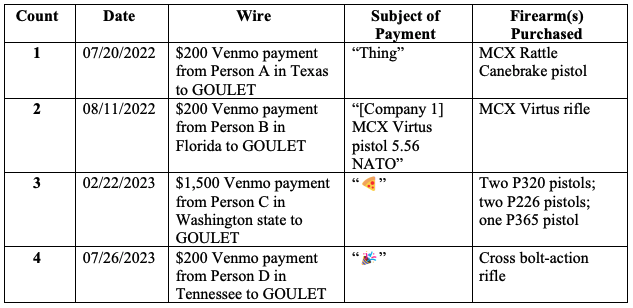On October 22, 2025, the Department of Justice announced the indictment of Patrick Goulet, a former Sig Sauer machinist, for allegedly using his employee discount, and in some cases the identities of his coworkers, to buy “several hundred discounted firearms” and resell them on social media platforms to buyers across the country between August 2021 and June 2024 — all without a Federal Firearms License, as required by law.
Worse yet, the indictment alleges that Goulet was able to continue his scheme even after being terminated from Sig Sauer, one of the country’s largest gun makers, in November 2023.1While the indictment does not explicitly name Sig Sauer as the gun company in question, and instead only refers to “Company 1,” the New Hampshire Union Leader made the connection. Goulet also noted that he was a machine operator for Sig Sauer on LinkedIn, and the trafficked firearms were all made by Sig Sauer.
What makes this case particularly alarming is not just the volume of weapons involved, but the ease and duration in which Goulet was able to carry out this activity, raising questions about Sig Sauer’s efforts to safeguard its inventory and ensure its employees do not abuse their positions to traffic firearms.
unlicensed gun sales
According to the indictment, Sig Sauer allows its employees “to purchase a limited number of discounted firearms and firearms accessories” and even “gift the discount to a friend or family member.” A search of employee reviews by The Smoking Gun found that the company purportedly offers up to 50-percent discounts on certain firearms, which a former employee called “one of the best perks of the job!”
However, as the indictment notes, Sig Sauer “prohibited its employees from selling or otherwise using the discount for personal profit.” Federal law also requires that people who intend to buy and sell firearms to “predominantly earn a profit” first obtain a license, conduct background checks on customers, and maintain inventory and transaction records, among other requirements.
But it appears that Goulet did none of that. The indictment alleges that as early as August 2021, Goulet “used social media platforms such as Facebook to locate customers interested in purchasing [Sig Sauer] firearms and accessories,” then offered them discounted products “in exchange for a fee” paid over “Venmo, Zelle, or PayPal.”
After Goulet allegedly used up his allotment of discounted firearms, he “obtained the names and company identification numbers for co-workers who had not used their allotted…employee discounts” and then submitted orders “using his co-workers’ names and badge numbers, but his own email address and phone number.” The indictment notes that Goulet also “designated his customers as the recipients of the discounted firearms and accessories.”
While the indictment does not say how many firearms were resold or where they ended up, a chart detailing some of Goulet’s alleged Venmo transactions (shown below) indicates that his customers lived across the country, in states like Florida, Tennessee, Texas, and Washington.

Assessing Sig Sauer’s Role
As discussed here, the firearm supply chain provides a steady stream of guns for traffickers. According to the Bureau of Alcohol, Tobacco, Firearms and Explosives, gun traffickers most commonly obtain their firearms from unlicensed dealers like Goulet, who often get them from licensed gun makers or sellers, followed by straw purchases and thefts from gun shops.
This particular case highlights how one gun maker’s inaction can lead to hundreds of guns falling into the hands of people who may be prohibited from owning them. In this instance, prosecutors say the leak did not begin in a gun shop or online, but on the factory floor.
Nothing in the indictment indicates that Sig Sauer had a system in place to detect or prevent the sales, or that the company alerted authorities, thus allowing Goulet’s alleged scheme to continue for nearly three years. It’s also unclear if Goulet still had access to Sig Sauer’s employee discount program after he was fired by the company.